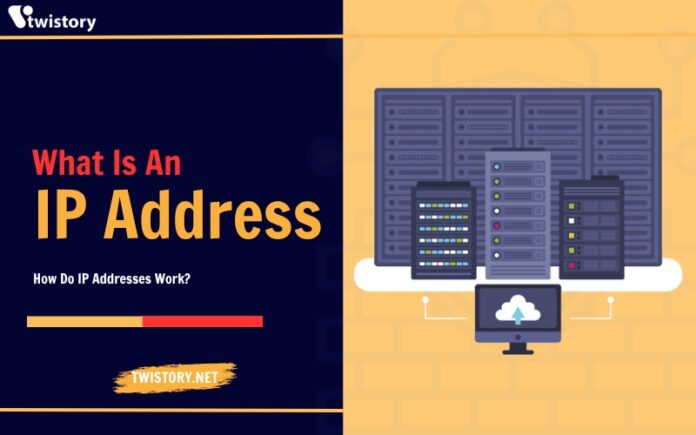An IP address, an indispensable component of the network system, serves as the key that enables us to connect and communicate over the internet. Gaining a solid understanding of IP addresses can help you safeguard your online business activities and enhance the efficiency of your web scanning.
In this article, we will jointly explore the concept of an IP address and how it operates. Concurrently, we will introduce the main types of IP addresses and highlight the challenges in IP management that you should be aware of.
What is an IP Address?
Just as you need an address to receive your online shopping packages, your internet traffic also needs an “address” to navigate the network – this is known as an IP address. An IP address, or Internet Protocol address, is an electronic address used to identify each device connected to the network. This address is typically provided by your Internet Service Provider (ISP) and helps the internet know where to send your data, search results, and queries. Therefore, the primary purpose of an IP address is to identify a device when it connects to a network, whether it’s an internal or external network.
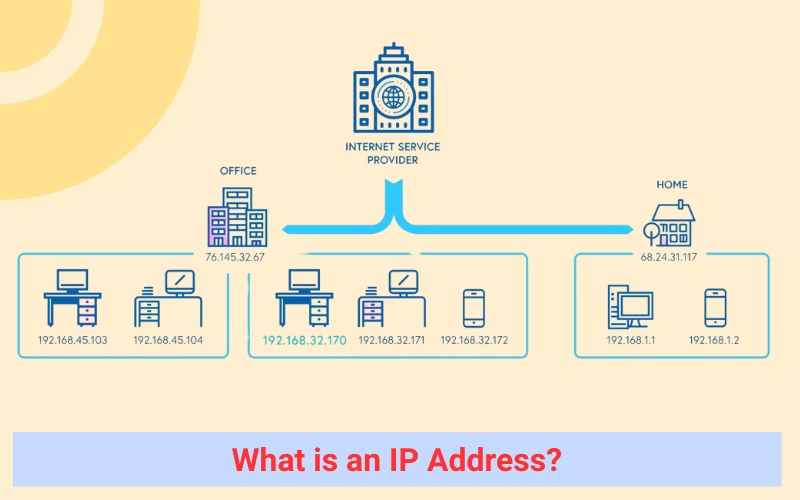
The Purpose of an IP Address
The primary purpose of an IP address is to provide a unique identity to devices connected to the network, enabling devices on the internet to distinguish and recognize each other, thereby facilitating communication.
Specifically, an IP address serves the following functions:
- Device differentiation and identification: An IP address is a unique string of numbers used to identify a specific device on the network. This allows devices on the network to distinguish and recognize each other.
- Data routing: When a device wants to send data to another device on the network, it uses the recipient’s IP address to route the data to the correct location.
- Network management: IP addresses are also used for network management. For example, Internet Service Providers (ISPs) can use IP addresses to manage customer connections.
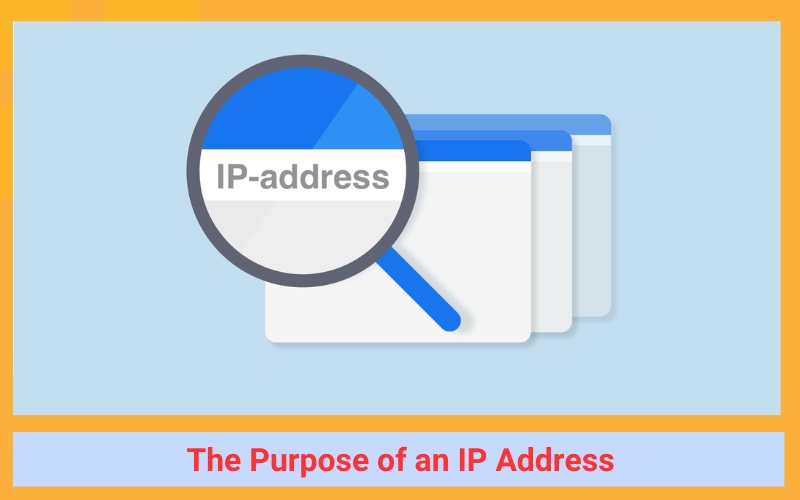
In addition, IP addresses are used for several other purposes such as:
- Providing location information: An IP address can be used to provide information about a device’s location. However, the accuracy of this location information depends on several factors, including the type of IP address, the Internet Service Provider, and the device’s settings.
- Advertising: Advertisers can use IP addresses to target advertisements to specific devices.
- Security: IP addresses can be used to authenticate users and access network resources.
IP Addresses and DNS
IP addresses and DNS are both crucial components of the internet, facilitating easy connection and communication across the network.
A domain name is a part of the address that is easy to read and remember. For instance, a domain name might look like this: “DomainNameSystem.com”.
While IP addresses are more understandable to computers and have specific locations, domain names are easier for humans to write and remember. When you use a domain name, the Domain Name System (DNS) translates it into an IP address so that the computer can identify the location you want to access.
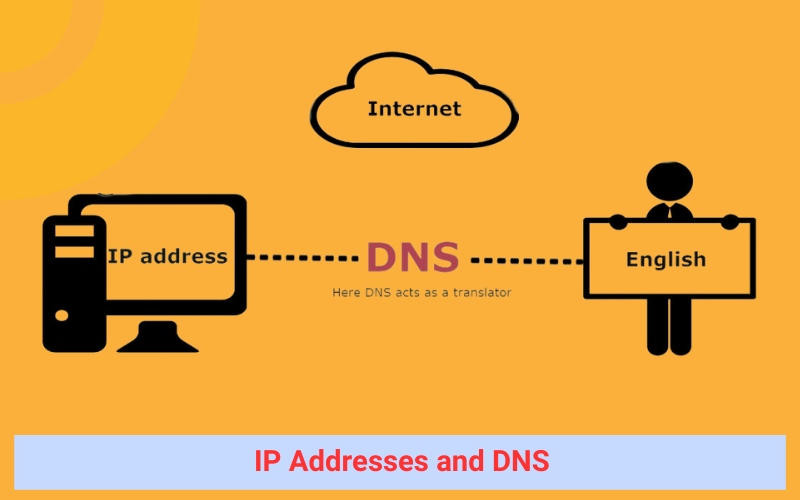
To facilitate this translation, DNS servers are typically used. Each computer usually has at least one DNS server configured for it, often provided by your Internet Service Provider (ISP). These DNS servers are usually located relatively close to you for efficiency and convenience.
When you access content on the internet, content providers can determine which DNS server you are using. For example, your DNS IP location can be used to determine your location, although not exactly, it can indicate which country or city you are in.
Versions of IP Addresses: IPv4 and IPv6
At present, we are using two versions of IP addresses, namely IPv4 and IPv6.
IPv4
IPv4, also known as Internet Protocol version 4, was introduced in 1981, following the experimental versions IPv1, IPv2, and IPv3. It became the first IP version to be widely used worldwide. With a 32-bit structure, IPv4 can generate up to 2^32, or nearly 4.3 billion (4,294,967,296) unique addresses.
However, with the relentless advancement of technology, the number of individual devices needing to connect to the Internet has rapidly exceeded the limit of unique addresses that IPv4 can provide. By 2019, RIPE NCC, one of the five Regional Internet Registries, reported that only one million unused IPv4 addresses remained. These limitations, among other reasons, have spurred the advent of IPv6.
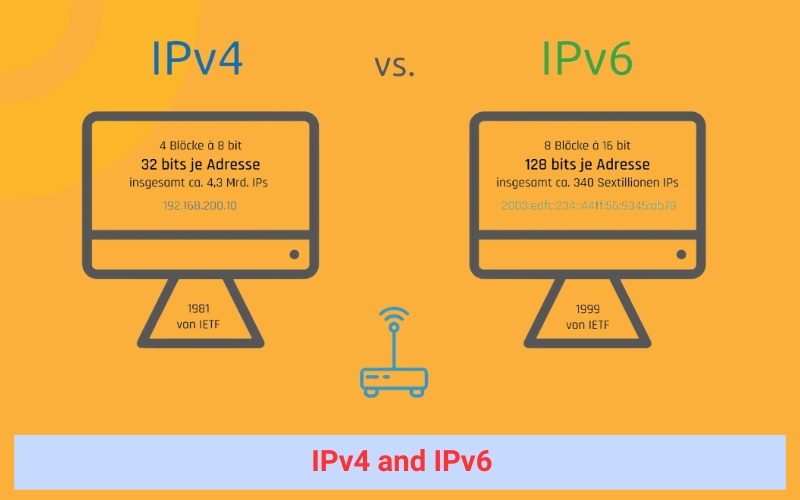
IPv6
IPv6, or Internet Protocol version 6, launched in 2012, uses a hexadecimal format and a 128-bit structure. This allows it to generate up to 2^128, or 340 undecillion (340,282,366,920,463,463,374,607,431,768,211,456) unique addresses. This number of addresses is sufficient to meet the anticipated growth of the web in the future.
Finally, there are several types of proxies designed to work with each version of the Internet Protocol, or in some cases, both. They can be used for various purposes, such as enhancing security or improving the web browsing experience.
Types of IP Addresses
Consumer IP Addresses
Typically, when you subscribe to a service from a provider, you are assigned an IP address to use. However, this IP address can belong to various types. Let’s explore the different types of IP addresses to gain a comprehensive understanding of internet protocol addresses.
Static and Dynamic IP Addresses
A static IP address is a stable IP address that an ISP assigns to a specific device. This means that your IP address may remain unchanged unless you request a change. Static IP addresses help maintain stability and easy access on the internet, especially when sending emails, gaming, or managing web servers. However, a limitation of static IP addresses is that they can make your network infrastructure more vulnerable to attacks if not properly managed.
In contrast to static IP addresses, dynamic IP addresses change automatically and frequently. This is the most common type of IP address and is typically assigned by the Dynamic Host Configuration Protocol (DHCP). When ISPs assign dynamic IP addresses, it helps them save costs, reducing the price of home IP addresses. Moreover, dynamic IP addresses enhance security as cybercriminals will have a harder time accessing your network.
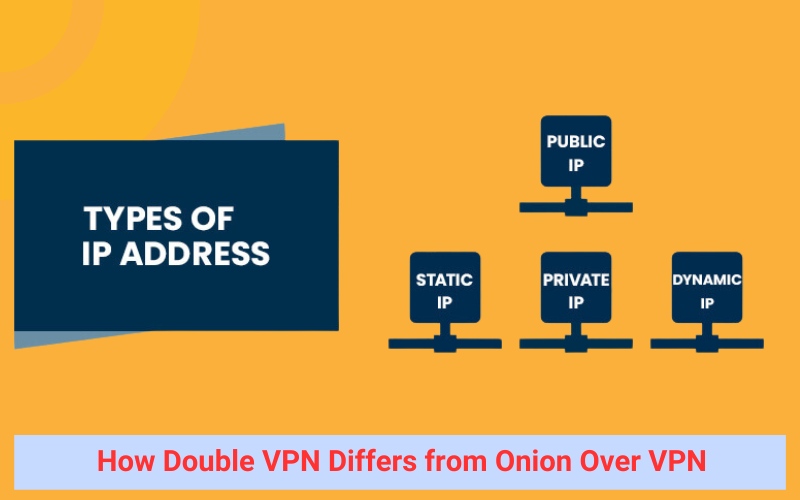
Private and Public IP Addresses
A private IP address is a unique numerical address assigned by a router to each device on a network via DHCP. This address helps distinguish devices from each other and is typically invisible from outside the private network. The router acts as a barrier, allowing you to establish a private IP network with any IP address scheme you want.
In contrast to a private IP address, a public IP address is assigned to a network by an ISP and can be seen from anywhere on the internet. This serves as a means to identify your network. When a device communicates with the router via a private address, such as 192.168.0.1, the router communicates with the Internet through your public IP address.
Shared and Dedicated IP Addresses
In many cases, website owners often use web hosting services instead of hosting on their own servers. This results in them receiving an IP address for their website, which could be a shared IP address or a dedicated IP address.
A shared IP address is commonly used when multiple businesses use the same web hosting service. This means that multiple domain names will share the same IP address. This is a suitable choice for websites with low traffic and simple web structures. However, this also means that the reputation of the IP address is shared. If someone using the same IP address sends spam and gets blacklisted, others using the same IP address will also be affected.
Therefore, some websites may choose to pay extra to have a dedicated IP address. In this case, the website will be the only domain name using that specific IP address and will have full control over it. This is a good choice for websites with higher internet traffic and complex web structures. It also facilitates the use of File Transfer Protocol servers, making it easier to obtain SSL certificates. As a result, file transfer within the organization becomes easier and safer.
How to Find Your IP Address
To find your IP address, you can follow these steps:
Public IP Address:
- Type “What is my IP address?” into the search bar of your web browser.
- Select one of the tools displayed in the search results to view your public IP address.
Private IP Address:
- Mac: Go to System Preferences -> Network -> Wi-Fi -> Advanced…
- Windows: Open the command prompt (cmd) and enter “ipconfig”
- iPhone: Go to Settings -> Wi-Fi -> Select the Wi-Fi network you are connected to -> View the DHCP section.
- Android: Go to Settings -> Wireless & Networks/WLAN -> Network & Internet -> Wi-Fi -> Select the Wi-Fi network you are connected to. If you don’t see the IP address, look in the Configuration or Advanced options.
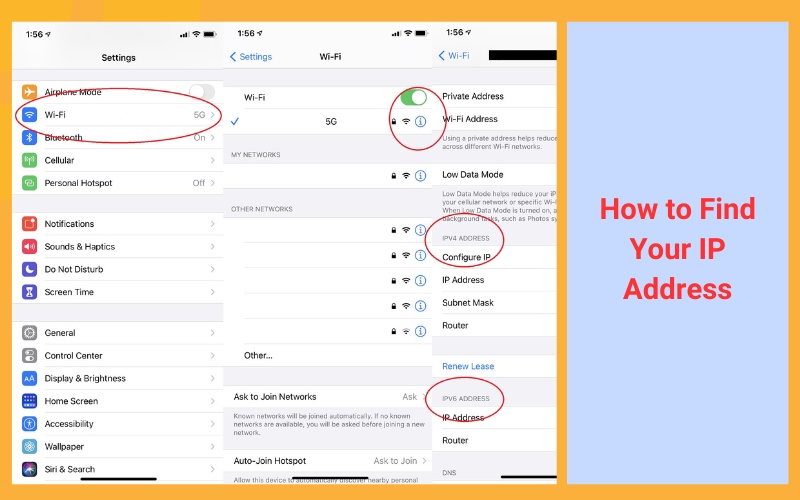
Risks Associated with Your IP Address
Revealing Your Location
Your IP address is associated with a basic geographical location, typically pinpointing to the level of a country or city, and in some cases, the zip code. While it’s quite challenging to determine your specific address solely from your IP, when combined with data from other sources, your location can be identified more accurately.
Hacking
While breaching someone’s system via their IP address isn’t straightforward, it’s certainly possible. Malicious actors could exploit an open gateway to establish a connection with your device. This action could then potentially allow them to access and steal your personal information.
DDoS Attacks
If someone possesses your IP address, they could potentially launch a Distributed Denial of Service (DDoS) attack against you. The modus operandi of a DDoS attack involves inundating your network with an overwhelming volume of requests, rendering it incapable of managing them. Consequently, you would be unable to access websites, emails, and your online accounts.
Personalized Spam
Your IP address can be used to monitor your online activities, such as the content you search for and view. This allows advertisers to tailor their ads to your preferences and needs.
Using Your IP for Illegal Activities
Your IP address could potentially be misused for illicit purposes. For instance, certain hackers might use your IP address to mask their illegal activities by installing malware on your device. If they are caught engaging in unlawful acts and your IP address is implicated, you could find yourself in unwanted trouble.
How to Protect Your IP Address
Your IP address could be exploited for nefarious purposes, and it’s crucial to safeguard it. Here are some measures you can take to protect your IP address:
Adjust your privacy settings
Ensure that all your apps, especially messaging ones, are set to “private” mode whenever possible. Avoid responding to calls, messages, or emails from unidentified senders, as they might be attempting to obtain your IP address.
Use a VPN or proxy
Employing a Virtual Private Network (VPN) or proxy can help shield you online. Both methods hide your IP address and replace it with a different one. A proxy acts as a gateway through which your connection is routed, while a VPN encrypts the data you send and receive.
Update your router
Regularly changing your router’s password is advisable, as routers are common targets for hackers. Ensure you create a strong password, incorporating uppercase and lowercase letters, special characters, and numbers.
Use Tor
Tor is an open-source software designed to route online traffic through an overlay network. It helps conceal your location, IP address, and online activities, although it may reduce your connection speed.
These are just a few ways to protect your IP address. For more detailed information, you can look up “How to hide your IP address“.
Conclusion
In conclusion, we’ve explored the concept of an “What is An IP address” and its significance in accessing and exchanging information online. An IP address not only helps servers determine where to send data but also plays a crucial role in securing information and data analysis. Hopefully, this article has provided you with a clearer understanding of IP addresses and their importance.
Don’t forget to check out more informative blogs from Twistory.net. We continually update with the latest and most useful knowledge for you.

